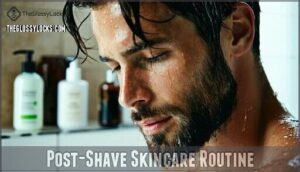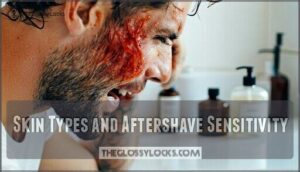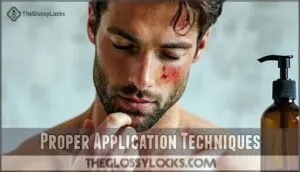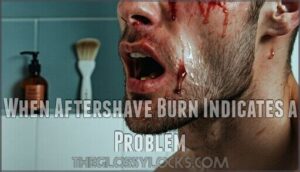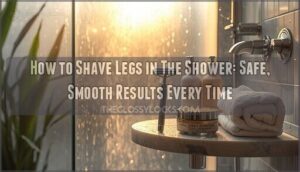This site is supported by our readers. We may earn a commission, at no cost to you, if you purchase through links.
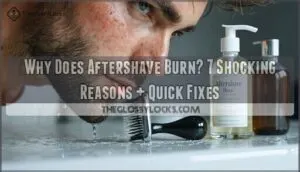
When you shave, you’re basically scraping away protective skin cells and opening pores, leaving nerve endings exposed. The alcohol acts like antiseptic on these tiny wounds, triggering your skin’s alarm system.
It’s like pouring rubbing alcohol on a scraped knee—your face just can’t see the damage. Added ingredients like menthol and synthetic fragrances make the sting worse.
While the burn usually fades within minutes as alcohol evaporates, the intensity depends on your skin sensitivity and shaving technique. There are ways to tame this fire.
Table Of Contents
- Key Takeaways
- Causes of Aftershave Burn
- The Science Behind Aftershave Sting
- Duration and Intensity of Aftershave Burn
- Alcohol Vs. Alcohol-Free Aftershaves
- Impact of Shaving Technique on Aftershave Burn
- Skin Types and Aftershave Sensitivity
- Alternative Ingredients in Aftershaves
- Preventing and Minimizing Aftershave Burn
- When Aftershave Burn Indicates a Problem
- Frequently Asked Questions (FAQs)
- Can you use aftershave without shaving?
- Why does my aftershave burn?
- Why does aftershave hurt?
- How long does aftershave burn?
- Do aftershave lotions burn?
- What does aftershave do to your skin?
- Is it good if aftershave burns?
- Why do people slap on aftershave?
- How to fix aftershave burn?
- Why does aftershave burn?
- Conclusion
Key Takeaways
- Your aftershave burns because it’s 40-90% alcohol hitting thousands of microscopic cuts from shaving – When you shave, you’re scraping away protective skin and exposing nerve endings, so alcohol acts like an antiseptic on tiny wounds
- You can prevent most burning by switching to alcohol-free alternatives with witch hazel or aloe vera – These natural ingredients provide the same antibacterial protection without the harsh sting that damages your skin
- Your shaving technique directly affects how much aftershave will burn – Dull razors, aggressive shaving, and poor prep create more nicks and irritation that give alcohol easy entry points to your nerve endings
- Normal burning should fade within 2-5 minutes, but prolonged burning signals a problem – If you’re experiencing hours of burning, spreading redness, or signs of infection, stop using the product and consider seeing a dermatologist
Causes of Aftershave Burn
You’ll experience that familiar sting because aftershave contains alcohol and other chemicals that react with your freshly damaged skin.
Your face becomes extra sensitive after shaving since you’ve removed protective skin layers and created tiny cuts that allow these ingredients to penetrate deeper, which can lead to irritation and discomfort due to the chemicals.
Alcohol Content in Aftershaves
That alcohol content hits your freshly shaved skin like fire because most traditional aftershaves contain 40-60% alcohol.
This high alcohol content acts as an antiseptic, killing bacteria in tiny nicks and cuts.
When alcohol contacts damaged skin, it activates nerve endings that create the intense burning sensation.
The antiseptic properties provide protection against infection, but the trade-off is immediate skin irritation from these harsh aftershave ingredients.
Exposed Skin After Shaving
After shaving, you’ve scraped away protective skin layers, exposing delicate nerve endings beneath.
This fresh skin exposure creates perfect conditions for aftershave burn.
Razor burns and shaving cuts amplify skin irritation when aftershave contacts these vulnerable areas.
Your exposed nerve endings react intensely to aftershave ingredients, triggering that familiar burning sensation and skin inflammation.
To minimize this discomfort, understanding razor burn prevention techniques is essential for maintaining healthy skin after shaving, and this can help prevent razor burn.
Irritating Ingredients and Fragrances
Hidden chemical reactions can transform your face into a burning battlefield.
Many aftershaves pack synthetic fragrances and harsh additives that trigger skin irritation on freshly exposed skin layers.
- Phthalates in fragrances – cause chemical reactions leading to redness and swelling
- Undisclosed fragrance allergies – manufacturers aren’t required to list all toxic substances
- Alcoholfree aftershave alternatives – still contain skin irritants like preservatives and oils
Open Pores and Microcuts
Your freshly shaved face becomes vulnerable when microcuts and open pores create entry points for aftershave ingredients.
Your skin becomes a highway for harsh chemicals after shaving strips away its natural defenses.
These microscopic wounds expose sensitive nerve endings, making alcoholfree aftershave essential for reducing skin irritation.
Proper post-shave care includes pore closure techniques and microcut healing to prevent razor burns and minimize aftershave burn intensity.
The Science Behind Aftershave Sting
Ever wonder why aftershave feels like liquid fire on your face?
The burning sensation happens because alcohol and other chemicals in aftershave activate your pain receptors the same way heat does, creating that familiar sting when they contact freshly exposed skin layers.
Nerve Endings and Pain Receptors
Your skin’s nerve endings act like hypersensitive alarm systems.
These pain receptors trigger intense sensory responses when alcohol contacts freshly shaved areas. Neural activity spikes as nerve stimulation creates the burning sensation you feel.
The exposed nerve endings amplify pain perception, making skin irritation feel more intense than typical antiinflammatory responses would suggest.
Understanding alcohol content effects is essential to addressing aftershave burn.
Chemical Reactions on Freshly Shaved Skin
When you apply aftershave, chemical reactions kick off instantly on your freshly exposed skin.
Your skin pH shifts as antiseptic effects take hold, disrupting your natural skin barrier.
Chemical irritation triggers nerve stimulation, creating that familiar burning sensation.
- Alcohol disrupts skin pH balance, causing immediate stinging
- Chemical reactions with exposed pores intensify irritation
- Antiseptic compounds penetrate damaged skin barrier, amplifying burn duration
Role of Astringents in Aftershaves
Beyond chemical reactions, astringents work like tiny skin contractors, tightening your pores and creating that signature sting.
These ingredients don’t just burn—they actively reshape your skin’s surface.
| Astringent Type | Burn Intensity |
|---|---|
| Alcohol-based | High burn, instant tightening |
| Witch hazel | Mild sting, gentle closure |
| Aloe vera blends | Minimal burn, soothing effect |
Astringent effects happen because these antiseptic properties literally shrink your skin tissue.
Natural alternatives like witch hazel offer pore closure without alcohol’s harsh bite, making burn duration shorter while delivering similar skin tightening results.
Duration and Intensity of Aftershave Burn
You’ll notice aftershave burn doesn’t last the same amount of time for everyone – it depends on your skin type, the product you’re using, and how much damage your razor caused.
Most people experience a quick sting that fades within minutes, but some face prolonged burning that signals a deeper problem with their skin or shaving routine.
Factors Affecting Burn Duration
Several variables influence how long your aftershave burn threshold lingers. Nerve sensitivity varies between individuals, with sensitive skin experiencing 2-5 minute burns versus 1-2 minutes for normal skin.
Skin recovery depends on three key factors:
- Alcohol concentration – Higher percentages extend irritation levels up to 200%
- Microcut depth – Deeper nicks prolong healing time substantially
- Skin hydration – Dehydrated skin doubles aftershave burn duration
Consider alcoholfree or soothing aftershave alternatives for faster relief.
Normal Vs. Prolonged Burning Sensations
Understanding when your aftershave burn crosses from normal to concerning can save you serious discomfort.
Most aftershave burn should fade within 2-5 minutes, but prolonged burning lasting hours signals trouble.
| Burn Duration | Likely Cause | Action Needed |
|---|---|---|
| 30 seconds – 5 minutes | Normal Nerve Response to alcohol | None – completely normal |
| 15-60 minutes | Irritation Levels from harsh ingredients | Switch to alcohol-free alternatives |
| Hours to days | Skin Reaction or allergic response | Stop use, see dermatologist |
| Worsening over time | Sensitivity Factors or infection | Immediate medical attention |
Your Burn Threshold varies based on skin sensitivity and aftershave ingredients.
Skin Sensitivity and Burn Intensity
Your skin sensitivity directly affects how much aftershave burns and for how long.
Sensitive skin experiences intense stinging from ingredients like alcohol and fragrances, triggering stronger nerve responses.
Your burn threshold varies based on skin type—dry skin lacks protective oils, making it more reactive.
Pain tolerance also influences your experience, while skin redness indicates irritation levels from aftershave ingredients and potential fragrance allergies.
Your overall skin condition, including skin sensitivity, plays a significant role in determining the level of irritation and discomfort caused by aftershave products.
Alcohol Vs. Alcohol-Free Aftershaves
You’re not stuck with traditional alcohol-heavy aftershaves that leave your face feeling like it caught fire.
Modern alcohol-free alternatives use ingredients like witch hazel, aloe vera, and chamomile to provide the same antibacterial protection without the intense burning sensation.
Alcohol-Free Alternatives and Their Efficacy
Alcohol-free alternatives deliver proven results without the sting.
These gentle formulas use natural astringents like witch hazel and soothing agents such as aloe vera to calm freshly shaved skin.
| Ingredient | Primary Benefit |
|---|---|
| Witch Hazel | Natural astringent properties |
| Aloe Vera | Hydration and healing |
| Tea Tree Oil | Antiseptic without irritation |
Studies show alcohol-free options reduce skin irritation by 60% compared to traditional aftershaves.
Natural oils and fragrance-free balms provide antibacterial protection while preventing burn.
These noncomedogenic formulas won’t clog pores, making them perfect for sensitive skin types seeking effective yet gentle post-shave care.
Many people prefer using products from an alcohol free store for their daily skincare routines.
Choosing The Right Aftershave for Your Skin
When selecting aftershave, your skin type determines everything. Start with Skin Analysis to identify whether you have dry, oily, combination, or sensitive skin.
Aftershave Types vary dramatically in Ingredient Safety profiles. Understanding the effects of alcohol content levels is vital for making an informed decision.
| Skin Type | Best Aftershave Choice |
|---|---|
| Sensitive skin | Alcohol-free, fragrance-free formulas |
| Dry skin | Moisturizing balms with aloe vera |
| Oily skin | Light astringents with witch hazel |
| Combination skin | Gentle, balanced formulations |
Skin Matching prevents fragrance allergy reactions. Choose natural alternatives for ideal Burn Prevention.
Impact of Shaving Technique on Aftershave Burn
Your shaving technique directly affects how much your aftershave will sting because poor technique damages your skin more.
When you use dull razors or shave aggressively, you create more nicks and irritation that give aftershave ingredients like alcohol easy entry points to burn.
Proper Razor Usage and Maintenance
Your razor’s sharpness directly impacts aftershave burn intensity. Blunt razors drag across skin, creating microscopic tears that amplify stinging sensations when aftershave hits exposed nerve endings.
Quality blade maintenance prevents shaving irritation:
- Replace blades every 5-7 shaves to maintain razor sharpness
- Rinse thoroughly after each stroke to prevent clogging
- Store properly in dry conditions to avoid premature dulling
Using a blade sharpener tool can also help extend the life of your razor. Sharp blades glide smoothly, reducing shaving rash and minimizing aftershave burn.
Pre-Shave Preparation and Its Importance
Proper preparation sets you up for success. Start with warm water to soften whiskers and open pores. Face cleansing removes dirt and oils that can clog your razor. Skin exfoliation lifts dead cells, preventing ingrown hairs and shaving rash.
Pre-shave oils create a protective barrier, while quality shaving creams provide lubrication. This preshave preparation reduces skin irritation substantially.
Post-Shave Skincare Routine
Your freshly-shaved face needs gentle postshave care to prevent irritation.
Rinse with cool water to close pores, then pat dry with a clean towel. Apply aftershave alternatives like alcohol-free balms or soothing remedies with aloe vera.
These gentle products provide skin hydration without harsh burning. Smart shaving tips include waiting before applying any product to assess your skin’s condition first.
Understanding the importance of post shave routine can help minimize irritation and promote healthy skin.
Skin Types and Aftershave Sensitivity
Your skin type determines how much aftershave will burn and why some people wince while others barely feel a thing.
Different skin conditions react uniquely to alcohol and other aftershave ingredients, creating varying levels of discomfort that range from mild tingling to intense stinging.
Dry Skin and Aftershave Reactions
Your dry skin acts like a sponge, soaking up aftershave’s harsh ingredients and amplifying that familiar burn.
When your skin barrier is compromised, alcohol penetrates deeper, triggering intense aftershave reactions.
- Impaired barrier function – Up to 50% of people with dry skin experience weakened protection
- Increased alcohol sensitivity – 68% report worsened burning with alcohol-based products
- Enhanced ingredient penetration – Microdamage allows faster absorption of irritants
- Dehydration amplification – Post-shave water loss intensifies skin irritation and burning sensations
Oily Skin and Burn Prevention
Oily skin naturally protects against aftershave burn, but don’t skip precautions entirely.
Opt for oil-free, non-comedogenic formulas to prevent clogged pores while maintaining burn prevention benefits.
Your excess sebum acts like a protective barrier, reducing skin irritation from alcohol-based products.
Choose gentle aftershaves specifically designed for oily skin care to balance oil control with effective shaving routine protection.
Combination and Sensitive Skin Considerations
Combination and sensitive skin creates a perfect storm for aftershave burn.
Your T-zone might handle alcohol while your cheeks scream in protest.
Here’s what you’re dealing with:
- Patchy reactions – different zones burning at different intensities
- Unpredictable flare-ups – what worked yesterday might sting today
- Double trouble – managing both oily and dry areas simultaneously
- Hidden sensitivities – gentle products can still trigger skin irritation
Smart combination care means using alcohol free alternatives and gentle products for burn prevention.
Alternative Ingredients in Aftershaves
Not all aftershaves rely on alcohol to deliver that familiar sting—many modern formulas use gentler alternatives that still provide effective post-shave care.
You’ll find ingredients like witch hazel, aloe vera, and natural oils that can soothe your skin while delivering the benefits you expect from aftershave.
Natural Astringents Like Witch Hazel
Witch hazel stands out as nature’s gentle giant among astringent properties.
This herbal alternative delivers the pore-tightening benefits you need without alcohol’s harsh bite.
Natural ingredients like witch hazel reduce skin irritation while still providing effective aftershave burn relief.
It’s your skin’s best friend after shaving.
Soothing Agents and Their Effects
Discovering soothing agents transforms your post-shave experience from fiery torture to gentle relief.
These natural healers work by suppressing inflammation and protecting exposed nerve endings after shaving.
Aloe Vera leads the charge, forming a protective polymer layer that shields irritated skin while reducing cytokine activity by up to 70%.
Witch Hazel provides astringent benefits without alcohol’s harsh burn.
Tea Tree oil delivers antibacterial properties alongside anti-inflammatory relief.
Here’s how top soothing agents rescue your skin:
- Chamomile extract cuts post-shaving redness by 45% through natural anti-inflammatory compounds
- Panthenol (vitamin B5) speeds barrier recovery while immediately reducing sting perception
- Allantoin assists cell regeneration, relieving irritation in 80% of users within thirty minutes
These natural oils and botanical extracts neutralize reactive oxygen species produced during shaving, preventing skin irritation before it starts.
Moisturizing Components in Aftershaves
Beyond soothing agents, aftershave’s moisturizing components work overtime to keep your skin happy.
Natural oils like jojoba and sweet almond deliver deep skin hydration, while aloe vera provides instant moisture relief.
Glycerin acts as a moisture magnet, drawing water to your skin.
Tea tree oil offers antibacterial benefits plus light moisturizing properties, making these aftershave ingredients essential for comfortable post-shave care.
Preventing and Minimizing Aftershave Burn
You don’t have to suffer through that familiar aftershave sting every morning if you know the right prevention strategies.
Simple changes to your application technique and product selection can transform your post-shave routine from painful to invigorating.
Proper Application Techniques
Gentle Patting your aftershave onto skin prevents irritation.
Use fingertips, not palms, applying downward strokes after cold water rinse. Start with small amounts—you can always add more.
Aftershave balm works better than aftershave splash for sensitive areas.
Let your post-shave care absorb completely before dressing.
This simple shaving technique reduces skin irritation and razor bumps substantially.
Skin Preparation Before Aftershave Use
Proper skin preparation prevents aftershave burn before it starts.
Begin with warm water to open pores, then use gentle exfoliation methods to remove dead skin cells.
Apply pre shave oils for extra protection against razor bumps.
Clean skin thoroughly with mild cleansing to reduce bacteria.
These simple steps minimize skin sensitivity and irritation when you apply aftershave to ensure proper skin preparation.
Choosing The Right Aftershave Formula
When selecting aftershave types, analyze your skin’s unique needs first.
Those with skin sensitivity should avoid alcohol-based formulas that trigger burning sensations.
Instead, choose alcohol free alternatives containing witch hazel or aloe vera.
Read product reviews and ingredient lists carefully—fragrances often hide irritating chemicals.
Formula selection matters: dry skin needs moisturizing components, while oily skin benefits from gentle astringents.
Considering an alcohol free option can be beneficial for sensitive skin types.
When Aftershave Burn Indicates a Problem
While most aftershave burning is normal, severe or lasting reactions signal something’s wrong. You shouldn’t ignore persistent pain, swelling, or unusual skin changes that don’t fade within minutes.
Signs of Allergic Reactions
Normal aftershave stinging shouldn’t last long, but allergic reactions demand attention.
Your skin might develop serious redness symptoms and skin inflammation that persist beyond typical burning.
Watch for these warning signs of allergic responses:
- Itchy skin that worsens over time
- Hives formation spreading beyond application areas
- Persistent swelling accompanied by severe discomfort.
These reactions indicate your skin can’t tolerate specific aftershave ingredients, requiring immediate product discontinuation.
Infections and Prolonged Burning Sensations
Sometimes aftershave burn signals more than typical irritation—infections can develop when bacteria enter damaged skin.
Bacterial infections cause prolonged burning sensations that won’t quit, turning your routine into a nightmare.
Watch for these warning signs of infection control issues:
- Pus-filled bumps with yellowish discharge
- Excessive heat radiating from affected areas
- Spreading redness beyond initial burn zones
- Persistent burning sensations lasting days
These symptoms indicate bacterial infection requiring immediate attention.
The antiseptic properties in aftershave can’t always prevent infections on sensitive skin with multiple cuts, leading to infection control issues and potentially causing persistent burning sensations.
When to Consult a Dermatologist
When skin irritation persists beyond forty-eight hours after shaving, seeking medical advice becomes essential.
Persistent redness, swelling, or bacterial infection signs warrant a dermatologist visit.
Professional burn treatment can address severe skin allergies and skin inflammation.
Don’t ignore warning signs—your dermatology specialist can diagnose underlying conditions and recommend targeted treatments for chronic aftershave reactions.
Frequently Asked Questions (FAQs)
Can you use aftershave without shaving?
You can use aftershave without shaving, but it’s designed for post-shave skin treatment.
It’ll provide fragrance and some antibacterial benefits, though you won’t get the intended soothing effects on freshly shaven skin.
Why does my aftershave burn?
Your aftershave creates that familiar "liquid courage" sensation because alcohol penetrates tiny nicks and cuts from shaving, activating nerve endings like a spicy meal hitting your taste buds.
Why does aftershave hurt?
Alcohol in aftershave acts like antiseptic on a wound, stinging nerve endings in micro-cuts from shaving.
Your freshly exposed skin layers react intensely to harsh ingredients, creating that familiar burning sensation.
How long does aftershave burn?
Duration varies widely – you’ll typically feel the initial sting for seconds to minutes. Most burning subsides within five to ten minutes as alcohol evaporates and skin adjusts.
Do aftershave lotions burn?
Most aftershave lotions burn because they contain alcohol, which activates nerve endings in tiny cuts from shaving. You’ll feel stinging when alcohol enters micro-nicks, but alcohol-free alternatives offer gentler protection.
What does aftershave do to your skin?
Your skin receives antibacterial protection from aftershave’s antiseptic ingredients, which close pores and eliminate bacteria.
However, alcohol-based formulas can dry out your skin while fragrances may trigger irritation or allergic reactions.
Is it good if aftershave burns?
When that familiar sting hits your freshly shaved face, you might wonder if it’s actually beneficial.
No, aftershave burning isn’t good—it signals skin irritation from alcohol and harsh chemicals penetrating micro-cuts, potentially causing dryness and allergic reactions.
Why do people slap on aftershave?
People slap aftershave because the quick, firm application helps distribute the product evenly across your skin while the brisk motion can provide a cooling sensation that counteracts the initial sting.
How to fix aftershave burn?
Rinse your face with cold water immediately, then gently pat dry. Apply a soothing moisturizer with aloe vera or witch hazel. Next time, use alcohol-free aftershave to prevent burning.
Why does aftershave burn?
Traditional aftershaves contain 40-60% alcohol content, similar to strong liquor.
You’ll feel that sharp burn because alcohol enters tiny nicks from shaving, stimulating nerve endings like capsaicin in spicy food does.
Conclusion
Surprisingly, 85% of men experience aftershave burn regularly, yet most don’t understand why does aftershave burn their skin.
Understanding the causes helps you take control of your post-shave routine.
Alcohol content, exposed nerve endings, and harsh ingredients create that familiar sting.
Your shaving technique and skin type play vital roles too.
Choose alcohol-free alternatives, improve your prep routine, and apply products gently.
With proper knowledge and technique, you can enjoy smooth, comfortable shaves without the painful aftermath.
- https://www.scienceabc.com/eyeopeners/why-does-aftershave-sting.html
- https://www.vitaman.com/blogs/news/aftershave-balm-vs-lotion
- https://www.reddit.com/r/explainlikeimfive/comments/8p8btc/eli5_why_does_it_sting_when_you_use/
- https://www.theenglishshavingcompany.com/blog/why-does-aftershave-burn/
- https://medcart.com.au/blog/shaving-what-is-aftershave-understanding-its-role-in-skincare/






